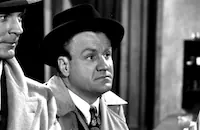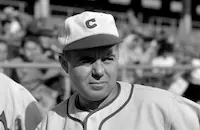Kelly and Me
Brief Synopsis
Cast & Crew
Robert Z. Leonard
Van Johnson
Piper Laurie
Martha Hyer
Onslow Stevens
Herbert Anderson
Film Details
Technical Specs

Synopsis
In Jersey City, New Jersey in 1930, Len Carmody, one of the last of the vaudeville song-and-dance men, struggles to earn a living. Len, who falsely believes himself to be a great entertainer, fires his manager, Dave Gans, after Dave announces that Len has once again been fired for being too demanding. Later, Len stops fellow entertainer Milo from abusing his performing German shepherd, Kelly, and an adoring Kelly follows Len home. Failing in his attempts to rebuff the dog, Len finally takes Kelly in. The next day, Kelly breaks loose from his leash during Len's act and joins him onstage, interrupting his pompous singing with expertly timed howls and tricks. With the dog as a comic foil, Len's act proves a huge success, and he is hired by visiting Utah theater owner Joe Webb. On the train to Utah, the conductor spots the dog in the passenger section and insists Len take him to the baggage car. While the two practice their act, Kelly sniffs out Mina Van Runkel, a young woman hiding in the car to whom the dog takes an immediate liking. Len also finds Mina appealing until she explains that she has run away from school to join her father in Los Angeles, and convinced that she is a mere child, Len tries to return to his cabin. Kelly, however, barks whenever Len moves away, so Len stays with the dog and offers the cabin to a grateful Mina. Unknown to Len, Mina's father, Walter Van Runkel, runs a film studio in Hollywood, and when Mina later shows up there and insists on working instead of returning to school, he happily concedes. The studio has just switched from silent to sound film production, and the high-pitched voice of their biggest male star is proving a disaster. Desperate for a new star, Walter is swayed by Mina's passionate praise of Kelly, and instructs her to bring the dog¿and his owner¿to Los Angeles for a screen test. Len is thrilled with his luck and rushes to the studio, never guessing that Walter is more interested in Kelly than him. Soon, Kelly, a natural and gifted film performer, is beloved by the whole studio, but will respond only to Len. Forced to include Len in Kelly's first movie, Walter offers him a role opposite Walter's new wife, budding star Lucy Castle. On the set, Kelly performs perfectly but Len creates problems by insisting on creative control. Director Stu Baker eventually refuses to work with Len, but Walter convinces him to agree to Len's demands but secretly shoot the film as scripted. Although Mina warns her father that the plan will end in disaster, Walter remains unconcerned, especially after test audiences adore the finished film. Before the press conference, however, Len sees the film and, furious at being tricked, prepares to leave town. Walter arrives at his apartment and urges him to build his career around Kelly. Realizing Walter is desperate, Len demands half ownership in the studio, and then shows off during the press conference. Mina has fallen in love with Len but now, disappointed in him, decides to return to school. In the next months, Kelly delivers a string of hit films and Len receives bags of fan mail that cause him to grow more egotistical and unmanageable. As Len's fame and fortune grows, he spends less time at home, leaving Kelly forlorn. Meanwhile, Lucy, who approves of Len's extravagance and ambition, embarks on an affair with him. When Len announces a planned opera for him and Lucy, Walter explodes in anger, revealing that the fan mail has all been spurious, created by his team to keep Len happy. Finally realizing that Kelly is the real star, Len seeks solace in the local bar, complaining about Kelly while the faithful dog waits for him outside. By morning, Len is contrite, and visits Walter with the news that he will allow Kelly to work in the films by himself. He is shocked, however, by the arrival of Milo, who presents papers proving that he is Kelly's legal owner. Walter throws out Len, but Kelly refuses to work without him. Later, after Milo whips Kelly on the set, the dog runs away, prompting Walter to fire Milo and call in Mina to help. She urges him to accompany her to San Francisco, where Len is now playing in dinner theater. There, Len refuses to talk to them, but secretly searches for Kelly each night. Days later, the train station employees spot a weary Kelly, who has tracked Len all the way up the coast. Meanwhile, Mina and Walter return to Len's theater, where they overhear him urging the police to help him look for Kelly. Overjoyed that he is finally living up to her expectations, Mina falls into Len's arms. Just then, they learn that Kelly is hiding among the trains, and Len announces to the waiting audience that he must leave to find his dog. Kelly, however, has been brought to the theater by the police, and the exhausted dog rushes onstage to join Len. When they finish their number, Len lets Kelly take a bow alone.

Director

Robert Z. Leonard
Cast

Van Johnson

Piper Laurie

Martha Hyer

Onslow Stevens

Herbert Anderson

Gregory Gay
Dan Riss
Maurice Manson

Douglas Fowley
Frank Wilcox
Yvonne Peattie
Elizabeth Flournoy

Lyle Latell
Kelly
Cynthia Patrick

Dani Crayne
Jane Howard
Frank Nelson

James Todd

Ray Walker
Madge Blake
Vincent G. Perry
Michael Ross
Hermine Sterler
Russ Bender

Elaine Riley
Jim Hyland
Bob Stephenson
Jack Lomas
George Ramsey
Helen Bennett
Frank Scannell
Watson Downs
Henry Rowland
Alan Reynolds
Ralph Neff
Hugh Boswell
Ralph Montgomery
Duke Johnson
Harry C. Johnson
Robert Strong
Lyle Moraine
Rex May
Charles Lind
Yvonne Cross
George Bruggeman
Robert Sherman
Richard Gordon
James Macklin
Tom Steele
Robert Wegner
Paul Bradley
Donald Kerr
Jack Stoney
Ann Kunde
Don Anderson
Edwin Tuttle
Hal Rand
Dennie Sullivan
Jack Carry
Martin Cichy
Joe Novelle
Crew
Robert Arthur
Buddy Bregman
Val Burton
Hughie Cannon
Leslie I. Carey
Everett Freeman
William Fritzsche
Russell A. Gausman
Joseph Gershenson
Maury Gertsman
Alexander Golitzen
Ray Jeffers
Ted J. Kent
Joe Lapis
Sam Messenheimer
Bill Newberry
Rosemary Odell
Harry Richman
Frank Shaw
Ernie Smith
Joan St. Oegger
Clifford Stine
Bud Westmore
Kenny Williams
Harry Woods

Film Details
Technical Specs

Articles
TCM Remembers Van Johnson - Important Schedule Change on TCM In Honor To Salute VAN JOHNSON
The new schedule for the evening of Tuesday, December 23rd will be:
8:00 PM In the Good Old Summertime
9:45 PM A Guy Named Joe
12:30 AM Thirty Seconds Over Tokyo
2:30 AM The Last Time I Saw Paris
4:30 AM Thrill of a Romance
Van Johnson (1916-2008)
Van Johnson, the boyish leading man whose clean cut, All-American appeal made him a top box-office draw for MGM during World War II, died on December 12 in Nyack, New York of natural causes. He was 92.
He was born Charles Van Dell Johnson on August 25, 1916, in Newport, Rhode Island. By his own account, his early childhood wasn't a stable one. His mother abandoned him when he was just three and his Swedish-born father offered little consolation or nurturing while he was growing up. Not surprisingly, Johnson found solace in singing and dancing lessons, and throughout his adolescence, he longed for a life in show business. After graduating high school in 1934, he relocated to New York City and was soon performing as a chorus boy on Broadway in shows such as New Faces of 1936 and eventually as an understudy in Rodgers and Hart's musical, Too Many Girls in 1939.
Johnson eventually made his way to Hollywood and landed an unbilled debut in the film version of Too Many Girls (1940). By 1941, he signed a brief contract with Warner Bros., but it only earned him a lead in a "B" programmer Murder in the Big House (1941); his contract soon expired and he was dropped by the studio. Johnson was on his way back to New York, but as luck would have it - in the truest Hollywood sense - friends Lucille Ball and Desi Arnaz introduced him to Billy Grady, a lead talent scout at MGM, which was currently Ball's new studio. Johnson was signed up and almost immediately MGM had a star on its hands.
It might have been slow going at first, with Johnson playing able support in films such as Dr. Gillespie's New Assistant and The War Against Mrs. Hadley (both 1942). By 1943 the studio capitalized on his broad smile and freckles and starred him in two of the studio's biggest hits: A Guy Named Joe and The Human Comedy. Those two films transformed him into a boxoffice draw with a huge following, particularly among teenage girls. A near fatal car accident that same year only accentuated the loyalty of his fans, and his 4-F status as the result of that accident created an opportunity for him when so many other leading actors of the era (James Stewart, Clark Gable) were off to war. Johnson was quickly promoted as MGM'sleading man in war heroics and sweet romancers on the big screen: The White Cliffs of Dover, Thirty Seconds Over Tokyo (both 1944), Thrill of a Romance, the episodic Week-End at the Waldorf (both 1945), and a musical remake of Libeled Lady entitled Easy to Wed (1946).
Hits though these were, it wasn't until after the war that Johnson began to receive more dramatic parts and better material such as supporting Katharine Hepburn and Spencer Tracy in the political farce State of the Union (1948). other significant roles included the well-modulated noir thriller The Scene of the Crime, the grim war spectacle Battleground (both 1949), the moving domestic drama Invitation (1952) in which he played a man who is paid to marry a woman (Dorothy McGuire) by her father. Before he left MGM, he closed his career out in fine form with the sweeping musical Brigadoon, co-starring Gene Kelly and Cyd Charisse; and the lilting soaper The Last Time I Saw Paris (both 1954) with Elizabeth Taylor.
After he left MGM, the parts that came Johnson's way weren't as varied, but he had his moments in The Caine Mutiny (1954), the beguiling romance drama Miracle in the Rain (1956) with Jane Wyman; and his lead performance in one of the first successful made for-TV-movies The Pied Piper of Hamelin (1957). By the '60s, Johnson returned to the stage, and played the title role in London's West End production of The Music Man. He then returned to Broadway in the drama Come on Strong. He still had a few good supporting parts, most notably as Debbie Reynolds' suitor in Norman Lear's scathing satire on marital differences Divorce American Style (1967); and television welcomed his presence on many popular shows in the '70s and '80s such as Maude, Fantasy Island, The Love Boat and of course Murder She Wrote. There was one last graceful cameo in Woody Allen's The Purple Rose of Cairo (1985), yet for the most remainder of his career, Johnson worked mainly on the dinner theater circuit before retiring from showbiz completely by the mid-90s. He is survived by a daughter, Schuyler.
by Michael T. Toole

TCM Remembers Van Johnson - Important Schedule Change on TCM In Honor To Salute VAN JOHNSON
Quotes
Trivia
Notes
According to a September 20, 1955 Los Angeles Examiner news item, Van Johnson's contract for Kelly and Me included a percentage of the film's profits. Studio press materials reported that Johnson requested Robert Z. Leonard to direct the picture.














